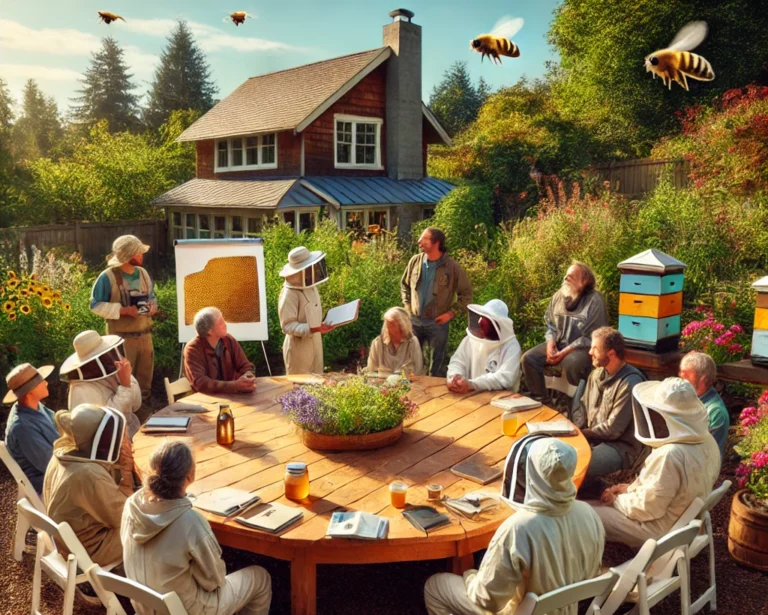
What Is NWBKA and Its Purpose?
The North West Beekeepers Association (NWBKA) is a group committed to supporting sustainable beekeeping. They connect beekeepers, provide education, and promote environmentally friendly practices. Their round table discussions address key issues like hive management, pest control, and the challenges threatening the future of beekeeping.
How NWBKA Promotes Sustainable Beekeeping
Helping with Hive Management
Good hive management is essential for healthy bees and a sustainable environment. NWBKA shares methods that reduce harm to bees, such as:
- Using natural pest control methods.
- Rotating hives to prevent disease spread.
- Avoiding harmful chemicals in hive treatments.
These practices help protect bees and ensure a healthy ecosystem.
Providing Education for Beekeepers
NWBKA runs educational programs for beekeepers at all levels. These programs teach:
- How to identify and treat bee diseases.
- Ways to use sustainable practices in honey production.
- The importance of planting bee-friendly flowers and plants.
Through training sessions and online resources, NWBKA helps beekeepers care for their hives responsibly.
Overcoming Challenges Faced by Beekeepers
Dealing with Pest Problems
Pests like Varroa mites and hive beetles are big threats to bees. NWBKA suggests safe pest management solutions, such as:
- Inspecting hives regularly for signs of pests.
- Using natural oils to deter mites and beetles.
- Trying biological controls that don’t harm bees.
By focusing on non-chemical solutions, NWBKA protects both bees and the environment.
Fighting Habitat Loss
Bees are losing habitats due to climate change and urban development. NWBKA works to combat this by:
- Promoting bee-friendly gardening.
- Partnering with local farmers to protect wild bee habitats.
- Encouraging the public to plant flowers that bees love.
These efforts create more spaces where bees can thrive.
Strengthening the Beekeeping Community
Connecting Beekeepers
NWBKA’s round table discussions bring together beekeepers to share experiences and solve problems. These meetings are a great way to learn new ideas and build friendships within the beekeeping community.
Working with Local Groups
NWBKA collaborates with schools, environmental groups, and governments. Projects include:
- Teaching kids about bees through school visits.
- Starting community bee garden programs.
- Raising awareness about the importance of bees.
These partnerships expand NWBKA’s reach and amplify its message.
Looking Ahead: The Future of Beekeeping
Embracing Innovation
To secure the future of beekeeping, NWBKA explores modern tools and methods, including:
- Smart hives that monitor bee health automatically.
- Sustainable ways to produce honey and other hive products.
- Finding new uses for beeswax and propolis.
By staying updated on the latest innovations, NWBKA helps beekeepers adapt to changing times.
Preparing for New Challenges
Environmental shifts bring new problems, such as emerging pests and diseases. NWBKA is committed to helping beekeepers face these issues with practical, forward-thinking solutions.
Why NWBKA Matters
The work of NWBKA benefits not just bees but also the environment and future generations. Their focus on sustainable practices, education, and collaboration makes them a leader in the beekeeping world.
Conclusion
The North West Beekeepers Association (NWBKA) is making a significant impact on the world of beekeeping. Through sustainable practices, education, and collaboration, they address the challenges faced by beekeepers and promote a healthier environment for bees. Their efforts not only protect the future of beekeeping but also contribute to the well-being of ecosystems. Joining or supporting NWBKA means being part of a movement that values innovation, sustainability, and community.
FAQs About NWBKA and Sustainable Beekeeping
1. What is the main goal of NWBKA?
The primary goal of NWBKA is to promote sustainable beekeeping by educating beekeepers, addressing environmental challenges, and fostering a collaborative community.
2. How does NWBKA support beekeepers?
NWBKA supports beekeepers by offering educational programs, hosting round table discussions, and sharing knowledge on hive management and pest control.
3. Why is sustainable beekeeping important?
Sustainable beekeeping ensures the health of bees, supports biodiversity, and reduces the environmental impact of traditional beekeeping practices.
4. What challenges do modern beekeepers face?
Beekeepers face challenges like pests (e.g., Varroa mites), habitat loss, climate change, and the need for eco-friendly hive management methods.
5. Can beginners join NWBKA?
Yes, NWBKA welcomes beekeepers of all levels, offering resources and training for both novices and experienced professionals.
6. What are some sustainable practices encouraged by NWBKA?
NWBKA advocates for practices like planting bee-friendly flowers, using natural pest control methods and minimizing chemical use in hives.
7. How can I get involved with NWBKA?
You can participate in their programs, attend their round table discussions, or collaborate on community projects by contacting them through their website or local chapters.
8. Why are bees important for the environment?
Bees play a crucial role in pollination, which supports food production and biodiversity. Without bees, many plants and crops would struggle to grow.
9. Does NWBKA promote the use of technology in beekeeping?
Yes, NWBKA explores modern solutions like smart hive technology to enhance bee health monitoring and hive management.
10. How does NWBKA help with pest management?
NWBKA provides guidance on natural and eco-friendly pest management methods, ensuring that beekeepers can protect their hives without harming the environment.